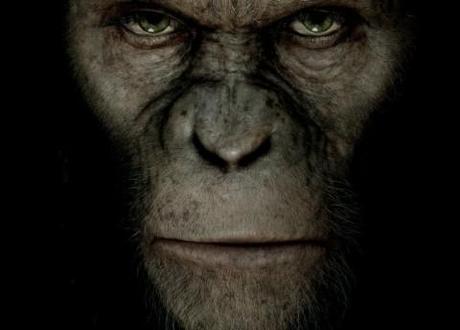
Poster for Rise of the Planet of the Apes
Rise of Planet of the Apes is a prequel, if you will, to the 1968 Planet of the Apes (which was itself followed by four sequels, as well as a TV series and a cartoon, and a remake in 2001 starring Helena Bonham Carter, directed by Tim Burton). Whilst Planet of the Apes (which starred Charlton Heston) showed humans battling against “dirty apes”, in ROTPOTA the balance is very much the other way around. Oooh, can you sense some kind of human/animal morality tale approaching?
Directed by the British Rupert Wyatt, ROTPOTA concerns Will Rodman (played by James Franco), a scientist experimenting on chimpanzees in order to find a cure for Alzheimer’s. His father is victim to the disease, adding that all-important human element. But are humans so human after all? (There you go.) Andy Serkis (yes, Gollum!) plays the chimp, aptly named Caesar. He’s imprisoned! He’s clever, too. Soon enough, the super-intelligent Caesar leads a revolt of the apes. The film is out in the same week as Project Nim, a documentary about an attempt to raise a chimpanzee as a human.
In a BBC article by Tim Masters, Rich Handley (author of Lexicon of the Planet of the Apes) explained the subtext behind the films. “They hold a mirror up to us – and the mirror has two reflections, neither of which is very flattering. In the first film you’ve got humans who are reduced to mindless savages, and intelligent apes who are literally aping human behavior and doing just as bad a job of it: they’ve still got prejudices, religious dogmatism and military paranoia.”
So what do the critics say?
“Apes will rise. Sequels are likely,” Kim Newman drily stated in Empire.
- Icky memories laid to rest. Tim Robey in The Daily Telegraph was mostly positive. It’s “one of the small handful of films” this summer “that you can feasibly imagine watching again, because it’s built on sound enough foundations to last.” It’s fashioned as a “simian prison flick”, whilst Andy Serkis “gives this creature soul, wiliness and a puckered resentment.” The human stories, though, are a “letdown.” Whilst not exploring the animal/human boundaries enough, Wyatt’s “delivered the goods with satisfying pace and craft — Weta Digital’s effects work on the apes, especially Caesar’s face, is unobtrusively marvellous, laying icky memories of the Tim Burton one to merciful rest.”
“James Franco and John Lithgow, as Caesar’s ‘owners,’ are kept in the background, while Freida Pinto, as a sympathetic vet, barely registers at all,” sneered Jim Lane, Sacramento News and Review.
- Transgressive. Peter Bradshaw in The Guardian liked the humans: “There is unexpected tenderness and also tension in the family scenes in which Will presides over a household in which his father has been gloriously brought back to mental life, and which is also invigorated by the little kiddie chimp swinging around the house.” Whilst not being as “scabrous” as its 1968 predecessor, “there is something transgressive in the story of Caesar’s relentless IQ-march, and a radical political education not attributable to the drugs”. This “monkey business” is “very enjoyable.”
- Don’t go! Nigel Andrews in the FT was a dissenting voice, sending people to Project Nim : “a must-see for anyone who wanders out of Rise of the Planet of the Apes – and you will – with the feeling: ‘Seen it all before. Show me some ape stuff that’s new and surprising.’”

